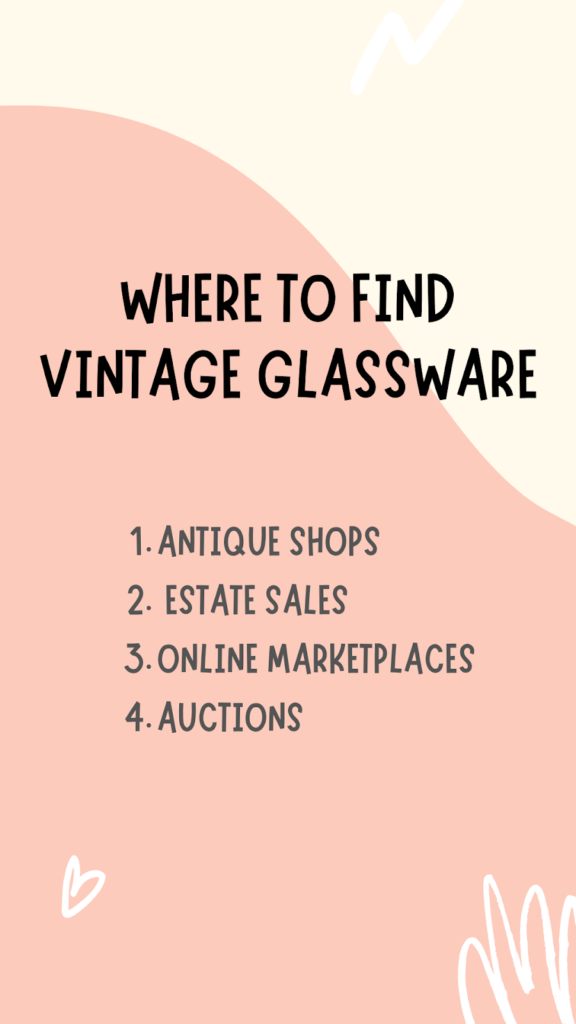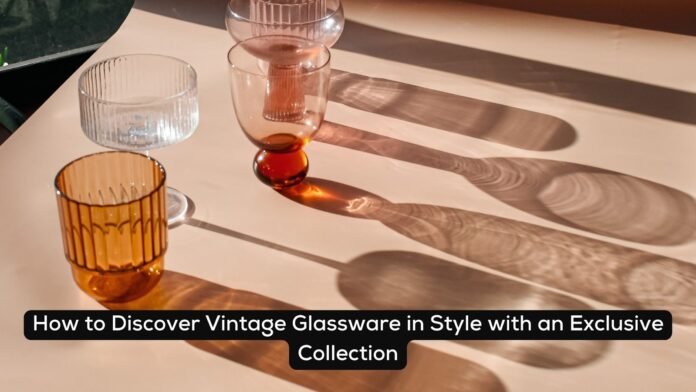Last Updated on August 5, 2024 by Ali Hamza
Vintage glassware evokes images of elegant dinner parties from decades past. With its intricate craftsmanship and timeless designs, vintage glassware brings a sense of nostalgia and sophistication to any space. If you’re captivated by the allure of starting your own vintage glassware collection, this guide will equip you with insider tips to discover these treasures in style
Table of Contents
Unveiling the Charm of Vintage Glassware
Vintage glassware encompasses a vast range of drinking glasses, decanters, vases, and ornamental pieces primarily from the 18th to mid-20th centuries. Vintage glassware’s appeal lies in its superior craftsmanship and attention to detail, imbuing each piece with a unique character.
Unlike mass-produced glassware today, vintage pieces were individually hand-blown and cut, often featuring subtle imperfections that add to their charm. Iconic brands such as Cambridge, Fostoria, and Depression glassware are highly sought after for their intricate patterns and bold colors. With some rarer pieces dating back to the early 1800s, vintage glassware also carries historical significance.
Owning a piece of the past evokes nostalgia and offers insights into the fashions and lifestyles of bygone eras. Whether you’re interested in elegant stemware, ornate vases, or whimsical candle holders, building a vintage glassware collection enables you to surround yourself with tangible history.
The Hunter’s Guide: Where to Find Vintage Glassware
Once you’re hooked on the appeal of vintage glassware, the thrill lies in the hunt – tracking down coveted pieces to add to your curated collection.

While it requires dedication, there are diverse sources to uncover prized treasures:
- Antique Shops
Antique malls and local shops offer an exciting “treasure hunt” experience, with row upon row of vintage finds. Take time exploring to uncover glassware gems, and don’t be afraid to ask the dealers about pieces that catch your eye. Their expertise can reveal insights on eras, styles, and values.
- Estate Sales
Estate sales are a prime source for vintage glassware, where you can often get quality pieces for reasonable prices. Arrive early before the crowds and come prepared with a list of patterns or brands you’re collecting. Carefully inspect each piece for chips, cracks, or other damage.
- Online Marketplaces
eBay and Etsy have become go-to venues for buying and selling vintage glassware. You can conveniently browse international selections and even research sold listings to identify fair pricing. Vet each seller thoroughly and watch for reproductions being passed off as originals.
- Auctions
Local auction houses may offer antique glassware among their estate lots. Previewing allows close inspection for conditions. On auction day, set a bidding limit for each desired piece. Online auctions through platforms like LiveAuctioneers also provide access to rare finds.
Tips for Successful Hunting
– Bring along a list of maker’s marks and patterns specific to your collection. This allows quick identification of pieces of interest.
– Examine for chips, cracks, cloudiness, or roughness when running your finger over the rim or exterior, which can decrease value.
– Research authenticity clues like pontil marks on bases or engraved signatures. Reproductions often lack these original details.
– Reference price guides to avoid overpaying. Scarce patterns or pristine condition warrants higher prices.
With persistence and the right strategies, the thrill of the hunt always leads to a new treasure for your vintage glassware collection.
Evaluating Your Finds: What to Look For
As you amass an array of vintage glassware finds, evaluating each piece is critical before adding it to your collection. Follow these key guidelines:
- Check Condition
The condition dramatically impacts the value and display appeal of vintage glassware. Pristine pieces fetch premium prices. Even small chips, cracks, or scratches can significantly reduce worth. Examine under good lighting and run fingers around the rim and base to detect subtle flaws. Authentic vintage glassware will have slight imperfections like air bubbles or mold lines versus modern mass-produced pieces.
- Verify Authenticity
Authenticity is crucial in vintage glassware. Study maker’s marks, logos, or signatures at the base. Meticulously crafted pontil marks also help confirm age. Quality of materials and craftsmanship details differentiate originals from convincing modern reproductions. Enlist a professional appraiser if doubts arise.
- Consider Rarity
More common vintage glassware patterns are readily available, making scarce pieces more desirable. Limited production runs, special commemorative editions, and one-of-a-kind finds command higher prices. Rarity is subjective so evaluate based on your specific collecting interests. Research references can provide production estimates.
- Match Your Collection Goals
As you evaluate potential acquisitions, carefully consider how each piece complements your overall collecting vision. Are you amassing a complete set of matching dishes or seeking diverse eras and styles? Establish collecting criteria and only retain pieces adhering to those goals to curate a cohesive look.
Curating Your Collection with Style
A thoughtfully curated vintage glassware collection elevates your decor far beyond utilitarian function. Follow these tips to create artful displays:
- Color: Coordinate colored glassware to create vibrant vignettes. Or opt for clear patterns to let the intricacy shine.
- Era: Mix different eras for visual depth or focus on a specific timeframe that defines your aesthetic.
- Patterns: Collect matching sets or combine patterns for eclectic charm. Repeating motifs create cohesion.
- Purpose: Integrate glassware into functional spaces like dining rooms or as décor accents in entryways, bedrooms, and more.
- Lighting: Position glassware near natural lighting or in illuminated cabinets to maximize sparkle.
- Labels: Identify rare finds by adding framed information cards about their history.
- Rotate Displays: Change up your arrangements seasonally to refresh your space and protect pieces from direct sunlight.
Let your personal style and decor guide you in flexibly showcasing your finds throughout your home.
Investment and Appreciation: Understanding the Value of Vintage Glassware
Beyond personal enjoyment, vintage glassware can prove a valuable investment as certain pieces appreciate significantly over time. Understanding market trends helps identify which segments offer the best return potential.
- Collector’s Items: Scarce, one-of-a-kind finds and limited production runs from renowned glassware companies. Pieces matching your established collection focus.
- In-Demand Patterns: Vintage patterns experiencing revived popularity like Mid-Century designs and Bold geometric styles.
- Mint Condition: Flawless pieces demonstrating superior craftsmanship and artistry. Even small defects drastically reduce worth.
- Reputable Resellers: Purchase from trusted antique dealers or verified sellers on auction sites. Provenance boosts future resale value.
- Rarity: Obscure patterns by forgotten companies or shorter production runs. Unique shapes, colors, and detailing indicate scarcity.
By investing in the right pieces after thorough research, your collection can potentially gain significant value over the years.
Maintenance and Care: Preserving the Beauty of Vintage Glassware
To retain the value and visual appeal of your vintage glassware acquisitions, proper care and handling are essential.
- Use gentle, non-abrasive cleaners and soft cloths to avoid scratching delicate surfaces.
- Hand wash only and skip harsh dishwasher chemicals that can damage finishes.
- Store glassware securely to prevent chips, cracks, or breaking. Invest in glass covers, padded boxes, or protective shelves.
- Allow Renaissance Wax polish to provide a protective barrier against dust and debris.
- Repair any loose handles or broken pieces immediately before further damage occurs.
- Examine glassware regularly when cleaning for any new flaws and address them right away.
- Keep glassware out of direct sunlight which can cause discoloration over time.
With the proper care and maintenance, your vintage glassware finds will stay pristine and retain their beauty and value as special showpieces for generations to come.
In Summary
Building a personal vintage glassware collection allows you to surround yourself with tangible history and unique treasures. But discovering those special pieces requires a spirit of adventure and perseverance. Follow this guide to uncover hidden gems at local shops and online marketplaces. Evaluate your finds against collecting goals for a cohesive look. And properly care for your acquisitions so they remain flawless showpieces to enrich your space.
The thrill of the hunt culminates in a collection as unique as your personal style. So start following your passion today and uncover the vintage glassware finds that speak to you!
Frequently Asked Questions
Focus your search on estate sales, thrift stores, and lower-tier online auctions to find quality pieces at more reasonable prices. Opt for lesser-known patterns initially until you can invest in pricier, rare items.
Popular collectible brands include Depression Glass, Cambridge, Fostoria, Fire King, and Pyrex, along with glass from renowned manufacturers like Tiffany, Steuben, and Lalique.
Rare, one-of-a-kind pieces in immaculate condition are most valuable. Specific patterns experiencing renewed popularity like Mid-Century and Cameo glass are also in high demand. Colored glass is generally more valuable than clear.


























